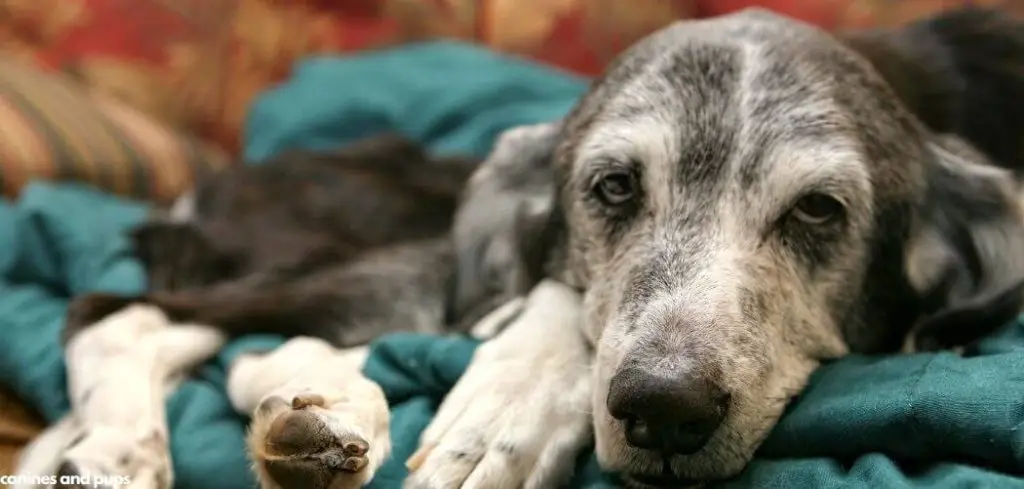When a dog has cancer and develops diarrhea, it can be distressing and concerning for any owner. Diarrhea in a dog with cancer can arise for several reasons, and it should never be ignored.
We outline the common reasons why a dog with cancer may develop diarrhea, what you can do, and when to seek veterinary help.
Table of Contents
Dog with Cancer and Diarrhea — Why It Happens
Diarrhea in a dog with cancer may be linked to the illness itself, side effects of treatment, or other underlying conditions. Cancer itself can affect the digestive tract, tumors may interfere with normal digestion, or the body may react to cancer treatments such as chemotherapy.
Secondary infections, poor nutrient absorption, or stress on the immune system may also contribute. Additionally, some dogs may experience diarrhea due to pain medications or dietary changes made to support them during cancer care.

Dog with Cancer and Diarrhea: Common Causes
Gastrointestinal Tumors
When cancer directly affects the gastrointestinal tract, it can lead to chronic or sudden diarrhea.
Tumors in the stomach, intestines, or colon disrupt digestion and absorption, causing irritation and frequent loose stools.
Owners may also notice weight loss, reduced appetite, or even blood in the stool. This type of cancer is serious and often requires specialized treatment.
Read more: Dog with cancer not eating and vomiting (Here’s why)
Side Effects of Chemotherapy or Radiation
Dogs undergoing cancer treatment may develop diarrhea as a side effect. Chemotherapy drugs can irritate the lining of the digestive system, making it difficult for the intestines to absorb fluids and nutrients properly.
Radiation therapy targeting abdominal areas can have similar effects. In these cases, diarrhea is often temporary but can weaken an already fragile dog, making supportive care essential.
Infections and Weakened Immunity
Cancer often weakens a dog’s immune system, either from the disease itself or from treatment.
This makes the body more vulnerable to bacterial, viral, or parasitic infections that can cause diarrhea. A dog with cancer and diarrhea from infection may also display fever, lethargy, or vomiting.
Prompt veterinary evaluation is important because even a mild infection can quickly become serious in a dog battling cancer.
Medication Side Effects
Many dogs with cancer are prescribed medications for pain relief, inflammation, or appetite stimulation.
Some of these drugs can cause gastrointestinal upset, leading to diarrhea. Non-steroidal anti-inflammatory drugs (NSAIDs), steroids, and certain antibiotics are common culprits.
If diarrhea begins soon after starting a new medication, the vet may adjust the treatment plan to reduce side effects.
Stress and Anxiety
A cancer diagnosis and ongoing treatment are stressful for both dogs and their families.
Stress alone can lead to diarrhea in dogs by disrupting normal gut motility and altering hormone levels.
While stress-related diarrhea may not be as severe as other causes, it can worsen a dog’s overall condition if not addressed. Comfort, routine, and supportive care can help minimize its impact.
Nutritional Imbalances
Dogs with cancer often require special diets tailored to support their health. However, sudden dietary changes or certain nutrient formulations can trigger diarrhea. Low digestibility or high-fat content may overwhelm the digestive system.
Balancing nutrition carefully with guidance from a veterinarian or veterinary nutritionist can reduce diarrhea and improve quality of life.
What to Do If Your Dog with Cancer Develops Diarrhea
If a dog with cancer develops diarrhea, supportive care at home can make a big difference.
Keeping the dog hydrated is essential, as diarrhea leads to fluid loss and potential dehydration. Offering fresh, clean water and possibly an electrolyte solution recommended by a vet can help.
Feeding small, bland meals such as boiled chicken and rice may soothe the digestive tract until stools begin to normalize.
Avoid sudden diet changes and high-fat foods, as these may worsen the condition. It is also important to monitor stool frequency and appearance closely, noting any blood, mucus, or unusual color.
Creating a calm, comfortable environment can reduce stress-related diarrhea.
Soft bedding, gentle routines, and avoiding overexertion are beneficial. If medications are contributing to diarrhea, never stop them without consulting the vet. Instead, discuss possible adjustments or supportive treatments to ease symptoms.
When to Call or Visit Your Vet
Any dog with cancer that develops persistent or severe diarrhea should be evaluated by a veterinarian.
Diarrhea in a healthy dog can sometimes resolve quickly, but in a dog battling cancer, it can lead to dangerous complications much faster.
Contact a vet immediately if the diarrhea is accompanied by blood, black tar-like stools, repeated vomiting, fever, lethargy, or refusal to eat or drink.
These may indicate internal bleeding, infection, or treatment complications. Severe dehydration is also an emergency, marked by sunken eyes, dry gums, or weakness.
Even mild diarrhea lasting more than a day or two in a dog with cancer should be reported to the vet. Prompt intervention can prevent worsening symptoms and ensure the dog’s comfort and safety.
Read more: Mucus In Dog Poop and Cancer (Understanding the causes)
Key Takeaway
When a dog with cancer develops diarrhea, it is a symptom that deserves careful attention. It may be linked to the cancer itself, treatment side effects, or other health complications.
Supporting hydration, diet, and comfort at home can help, but veterinary guidance is crucial.
Owners should never assume diarrhea will resolve on its own in a dog with cancer. Timely care not only manages the symptom but also helps maintain a better quality of life for a beloved companion during a difficult time.
